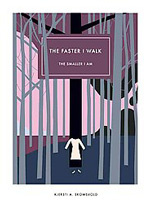

W. W. Norton (US), hardcover, 9781564787026
In 2009 Kjersti Skomsvold's slim debut novel won the Tarjei Vesaas prize, Norway's highest honour for a first book. Thankfully we have only had to wait two years for an English translation. I say thankfully, because The Faster I Walk, The Smaller I Am is a tragicomic masterpiece from a very promising young writer.
Mathea Martinsen is an elderly widow living in a housing complex in suburban Oslo. She has never been comfortable in social situations but, as she grows older, her lack of social skills and increasing age mean that she lives almost entirely without human contact. She feels as if she is disappearing from the planet. The novel traces her final attempts to be noticed by someone else, to reaffirm that she still exists in the world.
The Faster I Walk… is undoubtedly a depressing book. Watching another human being living, and dying, in solitude is no one's idea of a good laugh, and Skomsvold does not try to hide the tragic nature of Mathea's existence. Her story, however, is told with the darkest of black humour; for the right reader, the novel is both funny and bleak in equal measure. When Mathea's dog drowns in a lake in front of some schoolchildren, for instance, she doesn't know how to react, so just sits rooted to the spot until the children leave and she is able to walk home as if nothing happened. The absurdity of the scene made me smile while its loneliness broke my heart at the same time. Her only claim to fame (being struck by lightning) is taken from her when she realises that the lightning struck her, and not the other way round. Her attempts to overcome her shyness are awkward and absurd, almost slapstick on occasions, but all the time the reader is aware that this may be Mathea's last hope of clinging on to a life with other people in it, of continuing to exist.
The Faster I Walk, the Smaller I Am won't be for everyone. It is ultimately depressing and the prospect
of Mathea's lonely life and death is terrifying, but if a story like hers can be told then Skomsvold's mix of humour
and pathos is perhaps the best way. She extracts the absurdities of a disappearing life without cheapening her themes,
resulting in a superbly readable narrative and powerful short novel.
